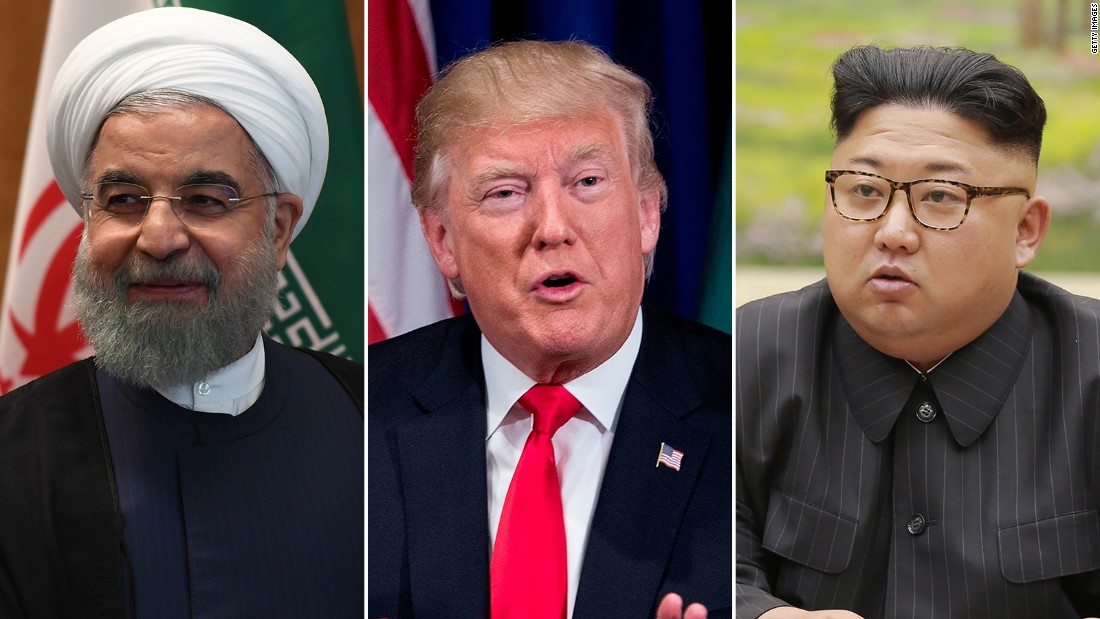Resolving The North Korea Crisis Through The Iran Deal
 Hassan Rouhani, Donald Trump, and Kim Jong Un
Hassan Rouhani, Donald Trump, and Kim Jong Un
by Seyed Hossein Mousavian
The second U.S.-North Korea summit in Vietnam failed to reach a nuclear deal despite hopes of a face-saving outcome. Still possible is an escalation of the crisis, which would have a disastrous outcome.
On March 29, Reuters revealed that Donald Trump handed North Korean leader Kim Jong Un a piece of paper asking Pyongyang to transfer its nuclear weapons and bomb fuel to the United States, provide a comprehensive declaration of its nuclear program and full access to U.S. and international inspectors, halt all related activities and construction of any new facilities, eliminate all nuclear infrastructure, and transition all nuclear program scientists and technicians to commercial activities. It was the first time that the U.S. president defined what he meant by the denuclearization of North Korea. Since Kim views these U.S. demands as insulting and humiliating, he is considering abandoning nuclear negotiations with the United States and resuming the nuclear and missile tests that brought the two countries to the brink of war.
National Security Advisor John Bolton has been insisting that North Korea dismantle its entire nuclear program and ship it to the United States the way Libya did. Since his time in the George W. Bush administration, Bolton has argued that the only way to remove the threat of North Korea is through regime change brought about by economic sanctions or a preventive war.
Simply based on rational choice, North Korea will not dismantle its nuclear program in expectation of future sanctions relief and security guarantees. Pyongyang has legitimate grounds to worry that the United States will not hold up its end of the bargain. After all, the United States has been repeatedly proven to be an untrustworthy negotiating partner.
In the Libyan case, for example, Moammar Qaddafi dismantled the country’s entire nuclear program in exchange for sanctions relief. The ultimate outcome was the total destruction of Libya. NATO would have not launched a bombing campaign against Libya if Qaddafi had not dismantled its nuclear program and instead possessed nuclear weapons. In the Iraqi case, the Bush administration spread fabricated news of Iraq’s nuclear weapons program to convince the international community that a war against Iraq was legitimate. Yet, it never provided credible evidence that Iraq had WMD capabilities.
The Iran nuclear deal (Joint Comprehensive Plan of Action or JCPOA) is another stark example. After 12 years of intense negotiations, accompanied by every possible diplomatic and economic pressure from the United States, Iran and the major powers finally agreed to this deal. The International Atomic Energy Agency (IAEA) has issued reports time and again attesting that Iran has complied fully to the terms and conditions of the JCPOA. Yet, the Trump administration withdrew from the deal. European parties involved in the negotiations not only regretted Trump’s decision, they considered it a “serious mistake,” because a better agreement for either parties was not possible at the negotiation table.
The JCPOA is the most intrusive mechanism to ensure the non-proliferation of nuclear weapons that the world has ever achieved. By withdrawing from such an important international agreement and violating Security Council Resolution 2231, the United States once again proved to be an untrustworthy and unreliable negotiating party.
In addition to its own breaches of international agreements, the United States consistently supports another violator of international law, and the Nuclear Non-Proliferation Treaty (NPT) in particular. Israel possesses many nuclear warheads and is a non-signatory to the NPT. Despite these violations, it enjoys enormous support from the United States.
Given such a dismal U.S. record on non-proliferation, why should North Korea trust U.S. promises of future sanctions relief and security guarantees in exchange for denuclearization? If anything, the case of the JCPOA has demonstrated that regardless of its pledges the United States can reinstate sanctions and even bully private multinational companies to divest from Iran.
As Yukiya Amano has said, the JCPOA is the world’s most robust nuclear verification regime. It should serve as a model for any future agreement with North Korea. If Trump sincerely wants to resolve the nuclear crisis with North Korea, he needs to rejoin the JCPOA, regain international credibility, and demonstrate to Pyongyang that the United States can be a trustworthy negotiating partner. The road to resolving the North Korean nuclear crisis passes through the JCPOA.
Seyed Hossein Mousavian is a professional specialist at Princeton’s Woodrow Wilson School and a former spokesman for Iran’s nuclear negotiators. His latest book, “Iran and the United States: An Insider’s view on the Failed Past and the Road to Peace” was published by Bloomsbury Publishers in May 2014. For the latest articles, publications, interviews, and lectures, visit hosseinmousavian.com

No comments:
Post a Comment